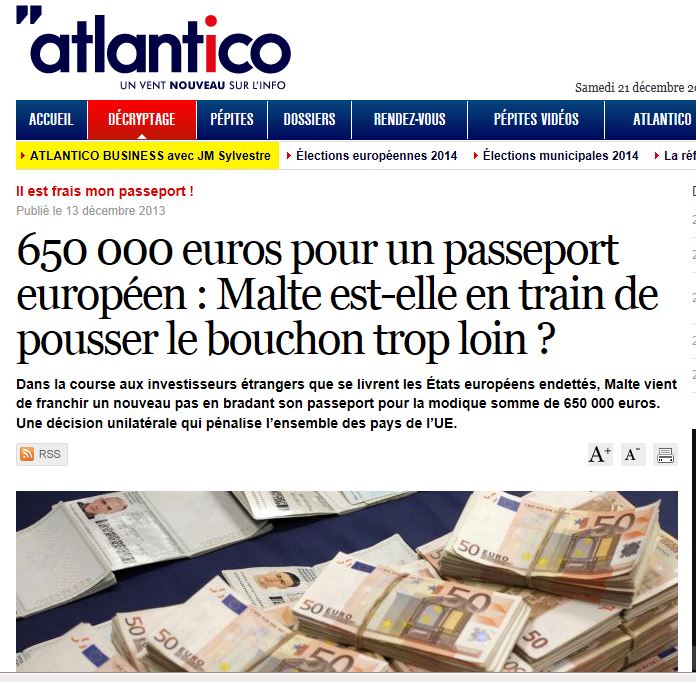Atlantico: ‘650,000 euros for a European passport – is Malta about to push the envelope too far?’
The French web paper Atlantico (liberal, pro-European, supported Sarkozy in the last election, and widely read by business professionals) recently published an interview with Jacques Barou, an expert on immigration issues.
“Pousser le bouchon trop loin” is idiomatic French for “overdoing it” – or pushing the envelope/your luck too far.
Here’s a translation of the relevant bits.
Atlantico: What are Malta’s particular circumstances and why should it wish to sell its citizenship without any conditions?
Jacques Barou: The first reason is economic: the aim is clearly to put money into Malta’s treasury. But it is also one way of increasing the demographic weight of Malta and its 400,000 inhabitants in the EU. The high price will also result in keeping away migrants, especially the poorest, and thus to put in place a selection based on financial criteria. Now money often comes with skills and qualifications; these new citizens will therefore fit more easily in Maltese society. Finally, it is one way to limit migration, since Malta will open the doors of the EU to these new passport-holders, which will inevitably push them towards other EU countries.
Atlantico: Is Malta the only example of this sort of scheme in the EU? Do the conditions for citizenship vary across the EU?
Barou: Selling a passport directly and without any obligation is a novel initiative, and one that’s out of the ordinary. In other countries, the acquisition of the right of residence is in general linked to financial conditions, such as the purchase of property in Greece or Portugal, for example, or industrial investment in the United Kingdom.
(…)
Atlantico: Are there any risks of unforeseen consequences, especially because of freedom of movement in the EU, in this desperate search for foreign investors and capital?
Barou: If you can buy a passport and if you can become European simply because you are rich enough, it is first of all unfair for those who cannot afford it. But it is mainly an incentive to emigration towards Europe for those who cannot speak the language and who do not make the effort to integrate culturally or linguistically.
It also opens the EU wide to those migrants who have no intention of respecting European laws. There is a risk of infiltration by unsavoury individuals. An enemy country could, for instance, make use of this scheme to infiltrate its agents.
(…)
There isn’t much that Brussels can do against the Maltese decision at this point, unless more European countries react negatively, which would oblige Malta to modify or restrict this scheme.
3 Comments Comment
Leave a Comment


http://www.atlantico.fr/decryptage/650-000-euros-pour-passeport-europeen-malte-est-elle-en-train-pousser-bouchon-trop-loin-jacques-barou-924933.html
Just in:
http://edition.cnn.com/2013/12/21/world/europe/malta-citizenship-program/index.html
“A unilateral decision which penalises all the EU countries” – that sums it all up in a nutshell.